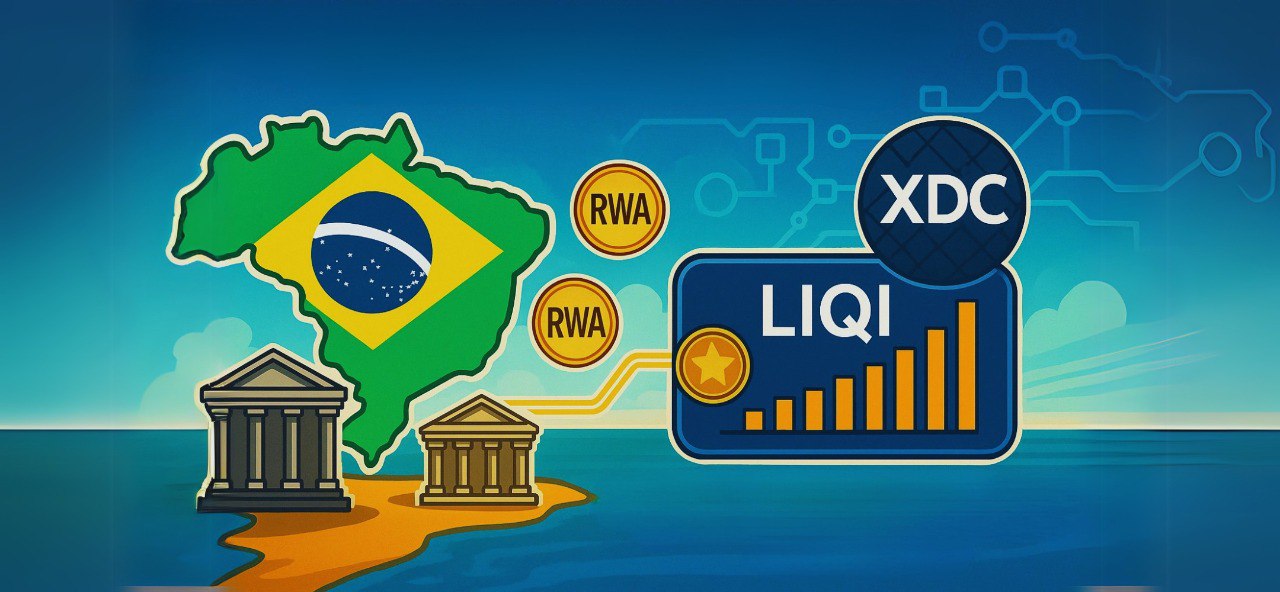In the push to modernize global finance, the spotlight often lands on complex innovations, yet one of the most impactful changes may lie in something as fundamental as credit. The recent partnership between the XDC Network and LIQI, a Brazilian fintech pioneer, is bringing new momentum to this space by tokenizing traditional credit instruments and putting them on the blockchain.
This move is not just a technical upgrade. It’s a rethinking of how credit can be issued, accessed, and traded, starting in Brazil but with implications across the world.
From Paper to Protocol: The Credit Market’s Long-Overdue Shift
Traditional credit markets rely on legacy infrastructure: paper-heavy processes, limited transparency, and slow settlement times. Instruments like credit rights, receivables, and corporate debt are often illiquid, restricting access to a narrow set of institutional players.
Tokenization changes that. It becomes possible to trade them instantly, audit them in real-time, and expand access to new classes of investors by representing credit instruments as digital tokens on a blockchain. In a word, it turns static assets into dynamic ones.
Why XDC and LIQI Are a Strong Match
The XDC Network has built its reputation as a public blockchain designed for real-world assets (RWAs), with a specific focus on trade finance, cross-border payments, and DeFi. Its fast, energy-efficient, and low-cost infrastructure is optimized for institutional needs.
XDC supports compliance with global standards like ISO 20022 and MLETR, giving it the legal and technical credibility to power financial transactions at scale. These features make it ideal for handling high-volume, high-value instruments like tokenized credit.
LIQI, for its part, brings regulatory muscle and local market expertise. Since 2021, the company has led Brazil’s movement in asset tokenization, working with major financial players such as Banco BV, Itaú, and SB Crédito. Its groundbreaking initiatives include the country’s first tokenized credit rights investment (TIDC) and other receivables-backed issuances.
Together, they’re building the infrastructure for Brazil’s next generation of financial products.
The Core Innovation: Tokenizing Credit Instruments
A shared goal is at the heart of the partnership: to bring real-world credit assets, including private credit, receivables, and corporate debt, on-chain.
Here’s how it works:
- Structuring: LIQI uses regulated frameworks under Brazilian law to structure credit-based financial products.
- Tokenization: These assets are then converted into digital tokens and issued on the XDC Network.
- Trading and Access: Once on-chain, the tokens can be traded, tracked, and managed in real time, allowing for better liquidity, broader investor participation, and enhanced transparency.
This approach isn’t theoretical. The partnership will issue up to $500 million in real-world assets in Brazil, starting within 90 days of the announcement.
Replacing the Old Guard: A Modern Alternative to FIDCs
In Brazil, traditional credit investment is often facilitated through FIDCs (Credit Rights Investment Funds). While FIDCs have been a useful tool, they come with operational frictions: long settlement periods, high entry barriers, and limited data transparency.
Tokenized credit instruments offer a smarter path. They are programmable, auditable, and easier to fractionalize. Investors can gain exposure to real-world debt without navigating a maze of intermediaries. For issuers, it means quicker access to capital and reduced reliance on traditional gatekeepers.
Why Brazil Is the Right Launchpad
Brazil’s regulatory environment is increasingly supportive of financial innovation. With ongoing efforts like open finance and the central bank’s digital real project (DREX), the country is emerging as a fertile ground for blockchain-based finance.
LIQI has already proven that institutional tokenization can work within Brazil’s legal framework. The collaboration with XDC is simply the next logical step but on a much larger scale.
This partnership is also forward-looking: the structure being built in Brazil is intended to scale globally. LIQI and XDC are proving out a model that can be exported to other markets by starting in one of Latin America’s largest economies.
Beyond the Tech: Real Impact on Capital Access
Tokenizing credit isn’t just about speed and cost efficiency. It’s about inclusion.
Small and mid-sized businesses (SMBs), often locked out of traditional funding sources, stand to benefit enormously. With tokenized instruments, they can access a broader pool of investors and raise funds faster.
Likewise, individual and non-institutional investors gain access to previously inaccessible credit instruments. With proper regulation and risk profiling, tokenized credit can help democratize finance.
A Signal to Institutional Finance
The scale of the LIQI-XDC collaboration, a planned issuance of half a billion dollars in credit-based RWAs is a clear signal to banks, funds, and regulators: tokenization is ready for prime time.
As Diego Consimo, Head LATAM at XDC Network, put it: “We are strengthening XDC as the reference infrastructure for financial applications backed by real assets, with global liquidity and on-chain execution.”
Looking Ahead
The tokenization of credit assets may not grab headlines the way cryptocurrencies or NFTs once did, but its impact on financial markets will likely be deeper and more lasting.
With LIQI handling compliance and origination and XDC delivering speed, scale, and interoperability, the partnership offers a viable blueprint for modernizing credit markets globally.
As the first issuances go live, XDC Network and LIQI collaboration shows how on-chain credit can unlock capital, reduce friction, and bring real-world finance into the digital age.



































